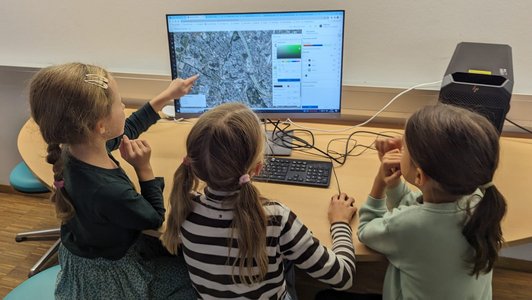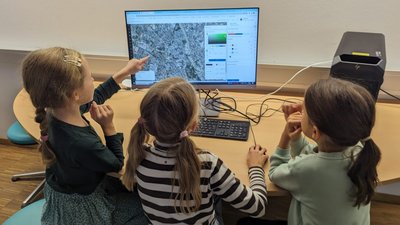Climate Agents
Planet A in a Digital World
“There is no Planet B“: The effects of climate change are increasingly permeating our daily lives and influencing our living environments and surroundings. Together with students, teachers and other citizen scientists the “Climate Agents” project follows a co-creation approach, which explores both thematically-scientifically and participatory science formats. The thematic focus is determined by students and citizen scientists, based on their personal environments. Possible focus topics include natural disasters (e.g., floods), winter tourism (e.g., snow security), or agriculture (e.g., crop failures).
The involved citizen scientists are investigating spatio-temporal developments related to climate change by comparing the past, present and future. The collaborative research is led by AI researchers from the field of geoinformatics, learning experts from the Ars Electronica Centre (AEC) and a university of education. The project utilises a wide variety of georeferenced data sources, e.g. personal observations from the surrounding area, self-recorded climate data, news articles, social media posts and official climate data from ZAMG. Data is then brought together, analysed, visualised cartographically and prepared as “stories”.
The project is based at the interface between the Department of Geoinformatics and the social sciences in the context of climate change research, shedding light on both technical and social backgrounds. In the ‘open space’ format, concrete research questions are developed in an open-ended exchange, which are then worked on together in various formats. Among other things, the students and other citizen scientists can carry out an AI-based data analysis. This independent, supported analysis serves as a basis for a better understanding of the possibilities and limitations of existing scientific methods.
Under the guidance of IT:U project staff, the students themselves will create so-called “StoryMaps” for presenting results and communicating science. In addition, a public “Climate Agents” app is being developed for continuous data collection. In addition to targeted workshops, broad public access to the project will be provided via a dynamic web map of the collected contributions available in the AEC as an interactive station. This app serves as a communication tool, interaction tool, discussion tool and for community building.
The “Climate Agents” approach will be tested for its suitability for direct integration into secondary school lessons. In addition to the technical research work, the project aims at social categorisation in the context of a profound understanding of scientific processes and practices. Through these findings, the pupils and other citizen scientists build up or expand their trust in science, disseminate it to the wider society via various formats and thus act as ‘climate agents’. They evolve from affected individuals to active agents.
The project offers interested citizen scientists the opportunity to actively participate in research.
More information
 Schools
Schools
 Partners from Economy and Society
Partners from Economy and Society
 Scientific institutions
Scientific institutions




